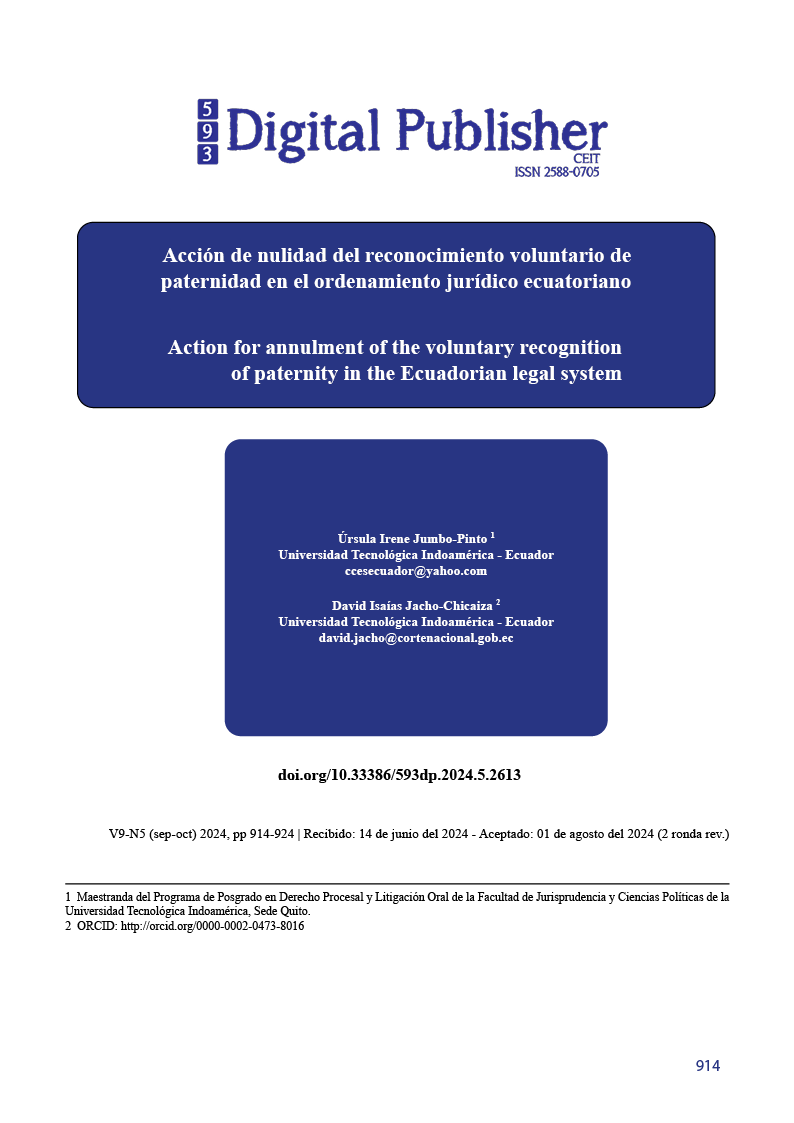Action for annulment of the voluntary recognition of paternity in the Ecuadorian legal system
Main Article Content
Abstract
Through a doctrinal analysis, a thorough review of the legal system and a jurisprudential study of the act of voluntary recognition, the fields of social and legal reality will be explained and expanded, as well as problems of social interest that may arise from the subject matter dealt with. Based on the Ecuadorian regulations and what is established in article 250 of the Civil Code, the acknowledger does not have the capacity to challenge the voluntary acknowledgement, but through nullity. The nullity is given in the cases in which the acknowledgement does not comply with what is expressed in article 248 of the Civil Code, in which the acknowledgement is described as a free and voluntary act, understanding that the nullity is given by means of a vice of consent, which distinguishes 3 types: error, force and fraud. In addition to declaring in the previously mentioned article 250 of the same body of law, the non-acceptance of the DNA test as a means of proof for the challenge in this case, this is established in this way because the challenge to the recognition does not consider a "biological truth" as a point to be debated, what is disputed in this kind of controversy is the act of recognition itself.
Downloads
Article Details

This work is licensed under a Creative Commons Attribution-NonCommercial-ShareAlike 4.0 International License.
1. Derechos de autor
Las obras que se publican en 593 Digital Publisher CEIT están sujetas a los siguientes términos:
1.1. 593 Digital Publisher CEIT, conserva los derechos patrimoniales (copyright) de las obras publicadas, favorece y permite la reutilización de las mismas bajo la licencia Licencia Creative Commons 4.0 de Reconocimiento-NoComercial-CompartirIgual 4.0, por lo cual se pueden copiar, usar, difundir, transmitir y exponer públicamente, siempre que:
1.1.a. Se cite la autoría y fuente original de su publicación (revista, editorial, URL).
1.1.b. No se usen para fines comerciales u onerosos.
1.1.c. Se mencione la existencia y especificaciones de esta licencia de uso.
References
Álvarez, N. (2018). Dificultadde probar la impugnacióndel reconocimiento voluntario y Derecho a la Identidad en la Legislación Ecuatoriana. Universidad Central del Ecuador. Quito. Trabajo de Titulación,pp.91.
Asamblea Constituyente. (2008). Constitución de la República del Ecuador. Registro Oficial 449 de 20 de octubre de 2008.
Asamblea General de las Naciones Unidas. (1966). Pacto Internacional de Derechos Civiles y Políticos.
Asamblea Nacional. (2015). Código Orgánico General de Procesos. Registro Oficial Suplemento 506 de 22 de mayo de 2015.
Avellán Domínguez, D. E., Chávez Castillo, J. E., & Arteaga Solorzano, Y. M. (2022). Impugnación del Acto de Reconocimiento del Menor. Polo del Conocimiento, 1(7), 1129- 1145. doi:10.23857/pc. v7i1.3532
Bosserte, G., & Zannoni, E. (2004). Manual de Derecho de Familia (sexta edición). Astrea de Alfredo y Ricardo Depalma.
Cabanellas, G. (2011). Diccionario Jurídico Elemental. Buenos Aires, Argentina Heliasta.
Congreso Nacional. (2003). Código de la Niñez y Adolescencia. Registro Oficial 737 de 3 de enero de 2003. Congreso Nacional. (2005). Código Civil. Registro Oficial Suplemento 46 de 24 de junio de 2005.
Corte Nacional de Justicia del Ecuador. (2014). Resolución No. 05-2014. Registro Oficial No. 346,
Suplemento, 2 de octubre de 2014. Devis Echandía, H. (1968). Nociones generales de derecho procesal civil.
Lagos L, M., Poggi M, H., & Mellados S, C. (2011). Conceptos básicos sobre el estudio de paternidad. Rev Med Chile 2011 ISSN 0034-9887(139), 542-547.
Lagos, M., Poggi, H., & Mellados, C. (2011). Conceptos Básicos sobre el estudio de paternidad. Rev. Med Chile, 139(4), 542-547. doi: ISSN 0034-9887
Mera, I. (2019). Vulneración al Derecho de Identidad por Decisión Judicial, cuando se Impugna la Paternidad de una Persona que ha sido Reconocida Voluntariamente. Universidad Laica Vicente Rocafuerte de Guayaquil. Ecuador. Trabajo de Titulación,pp.86.
Mera Guaycha, K. M. (2017). Vulneración De Los Derechos Que Le Asisten Al Presunto Progenitor En Los Procesos De Impugnación De Paternidad. Machala, Ecuador: Universidad Técnica de Machala.
Naula Amboya, J. O. (2018). La impugnación del acto de reconocimiento de paternidad [Tesis de grado, Universidad Nacional de Chimborazo]. Repositorio institucional. Organización de los Estados Americanos. (1969). Convención Americana sobre Derechos Humanos.
Pérez Dapuetto, J. L. (2021). La aplicación de nulidades según el Código Orgánico General de Procesos [Trabajo de titulación, Universidad Católica de Santiago de Guayaquil]. Repositorio institucional UCSG.



